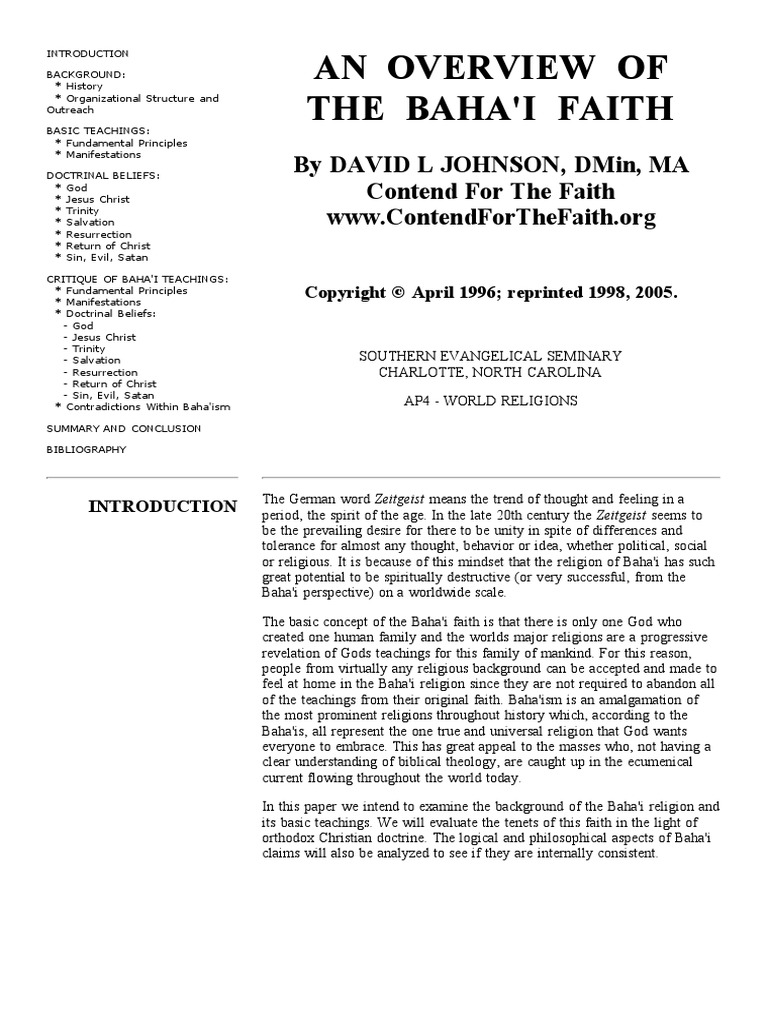The journey of faith is a profound undertaking that can have transformative impacts on one’s beliefs and worldview. In the context of the Bahá’í Faith, the movement from a Christian pastor to a Bahá’í adherent is particularly illustrative of how spiritual progression can lead to the embrace of an entirely new set of principles, values, and convictions. This exploration will delve into the nuanced aspects of this transformative journey, highlighting key Bahá’í teachings that resonate with those who have experienced a shift in their spiritual orientation.
At the heart of the Bahá’í Faith lies the concept of the oneness of humanity. This principle posits that all human beings, regardless of their cultural, racial, or religious backgrounds, are part of a single, interconnected family. For a pastor rooted in the Christian tradition, this notion may challenge longstanding beliefs about exclusivity and salvation. The Bahá’í emphasis on collective unity transcends sectarian divides and encourages a more inclusive approach to spirituality. This radical perspective invites a reevaluation of one’s understanding of community, fostering a sense of shared responsibility for the wellbeing of all.
Central to the Bahá’í doctrine is the idea of progressive revelation. This tenet asserts that divine guidance is imparted to humanity through a series of Messengers or Manifestations of God, each tailored to the needs of the time. Transitioning from Christianity to the Bahá’í Faith, a former pastor might reflect on the roles of Jesus Christ and Bahá’u’lláh, the founder of the Bahá’í Faith. One may come to appreciate how the teachings of Bahá’u’lláh build upon the foundations laid by earlier prophets while addressing contemporary spiritual challenges. This reinterpretation of divine revelation can usher in a profound understanding of the evolution of religious truth and its implications in the modern world.
The notion of the harmony of science and religion is another pivotal theme within Bahá’í teachings that may resonate with individuals transitioning from a more traditional Christian perspective. The Bahá’í Faith promotes the idea that religion and science are complementary avenues of understanding reality. For a pastor accustomed to viewing faith and reason as distinct and often conflicting domains, this concept can be enlightening. It fosters a holistic approach, encouraging the pursuit of knowledge and empirical truth alongside spiritual insights. Such a synthesis can lead to a deeper appreciation of the mechanisms governing the universe—an acknowledgment of the divine in the workings of nature.
Furthermore, the principles of justice and equality are foundational to the Bahá’í teachings, with an emphasis on the eradication of prejudice and the establishment of social justice. This focus can be particularly compelling for individuals coming from a Christian background, where themes of grace and compassion are prevalent. Engaging with the Bahá’í commitment to social equity may inspire a former pastor to become an advocate for marginalized communities. This transition emphasizes an active engagement with the world, urging adherents to translate their spiritual convictions into tangible actions that uplift and empower others.
Another integral aspect of the Bahá’í Faith is the significance of prayer and meditation. While Christian practices often emphasize communal worship, the Bahá’í approach encourages both individual and collective spiritual practices. A former pastor may discover new dimensions of spirituality through personal reflection and supplication, fostering a more intimate connection with the divine. This practice acknowledges the importance of quietude and inner peace as essential tools for personal growth and understanding. The inclusion of daily prayers and meditative practices can enrich the spiritual life, enabling a deeper communion with the mysteries of existence.
The commitment to lifelong learning is espoused within the Bahá’í teachings. For someone transitioning from pastoral leadership to Bahá’í allegiance, the emphasis on the cultivation of knowledge can serve as a revitalizing pursuit. This quest for understanding is not limited to religious texts; it encompasses all areas of human knowledge, fostering an environment of inquiry that remains crucial throughout one’s life. The Bahá’í Faith encourages individuals to confront ignorance and seek education as a means of personal and collective advancement, establishing a culture that values critical thinking and moral development.
In this transformative journey, the role of community cannot be overstated. The Bahá’í community provides a supportive environment that facilitates spiritual growth and collaboration. For a former pastor, the communal aspect may reaffirm the communal values experienced in Christian congregations, yet it expands the notion of community to a global scale. Participation in devotions, community service, and consultation promotes cohesiveness and unity, reinforcing the Bahá’í vision of a harmonious world. This interdependence within the community ultimately becomes a foundation for personal and socio-spiritual development.
As one reflects on this profound journey from Christianity to the Bahá’í Faith, the overarching themes of unity, inclusivity, and mentorship remain salient. A transition enriched with Bahá’í teachings offers an opportunity to embrace new beliefs while honoring the values of the past. The bubbling intersections of faith, reason, and purpose can foster a profound sense of belonging to both the divine and the community. As you navigate this path, the essence of Bahá’í teachings provides a roadmap for the soul, guiding former pastors and seekers alike towards a more vibrant and interconnected existence.
In conclusion, the journey of faith from a Christian pastor to a Bahá’í adherent encapsulates a myriad of transformative experiences. Through the lens of Bahá’í teachings, the exploration of unity, progressive revelation, and the interplay of religion and science creates a rich tapestry of understanding. This evolution encourages individuals to engage actively with their beliefs and to foster a deeper connection with humanity. By embracing the principles of justice, equality, spiritual practice, and lifelong learning, the individual is invited to embark on an enriched spiritual odyssey, one that resonates deeply with the principles of the Bahá’í Faith.
